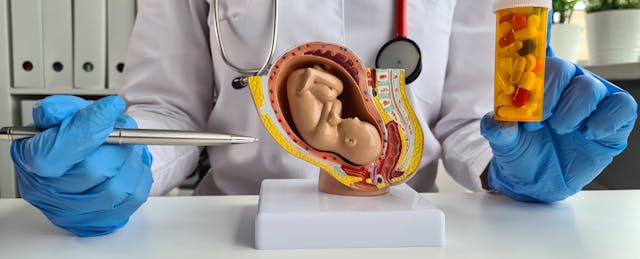This past June, during what should have been a pride-filled, celebratory season, the uterus took center stage in a series of controversial events.
On Monday, June 20, the Hawaiʻi state governor signed a new law making menstrual products free and accessible at all public schools in the state. By the end of the week, Friday the 24th, the United States Supreme Court overturned the nearly 50 years of federal abortion rights granted by the Roe v. Wade ruling.
After the ruling, comments flew back and forth between Twitter and Facebook, igniting a hot debate about a person’s right to bodily autonomy and the definition of life. Even in Hawai‘i, educators, civilians, and politicians alike were upended by the idea that taxpayer funds would be used to support student access to menstrual supplies.
Needless to say, a lot can happen over the course of a week, and these events undoubtedly have severe implications regardless of your party affiliation or political beliefs.
I am fortunate to live and work in Hawai‘i, a state largely unaffected by the decision to overturn Roe v. Wade. Growing up, I had access to Plan B prescriptions at my college health center, even in a red-leaning state. After returning to Hawaiʻi and entering the teaching profession, I developed a pedagogy that asserts science is political and students have the right to facts-based education.
I am ardently pro-choice. I chose the beautiful burden of being a parent. I made this decision and am grateful to have had the choice. As I view my responsibilities as a female-presenting person of color and science educator who teaches through a lens of intersectionality, I wonder, what should the biology classroom look and feel like upon a return to school after the overturn of Roe v. Wade?
Culturally Responsive Science
Biology is often a student’s final health-focused class before graduation. As such, the definition of life is a common theme explored in most biology curricula and textbooks nationwide. Over the last 10 years, I’ve fielded questions from hundreds of students that ask, “When does life begin?” and “How do we determine what is living and what is not?” Furthermore, to live in Hawaiʻi is to know that cultural competence is foundational to national science standards. To honor the Indigenous Hawaiian worldview, we not only question the meaning of life, but we also ask: Is spirit synonymous with life?
‘Āina, our land, is alive and gives life to all that thrives on it. Hawaiians believe that everything has a spirit. Spirit and life are not separate. Indigenous Hawaiian knowledge also predicates that life began with a first breath. The importance of hā, breath, is that which connects us and exchanges life. These conversations deepen our understanding of life and blur the static definition found in most biology textbooks.

In our class, science does not live in the guise of neutrality, and we are well aware of the ways science has been used to exploit our community. From a local bioethics perspective, students learn about the syphilis experimentation at Kalaupapa, on Molokaʻi. Kalaupapa is commonly known for the forced isolation of leprosy patients from the reign of King Kamehameha V until 1969. However, there is a lesser-known narrative about a California physician, acting as a health care officer, who injected syphilis in Native Hawaiian girls to learn about the disease’s progression. These girls were previously infected with leprosy.
The physician’s obvious disregard for bodily autonomy is a pervasive reminder of the oppression women of color face locally and nationally, especially in the name of science. As people who value learning and being in community, we must remain vigilant against the attacks on personal and societal freedoms.
I have had my share of classroom discussions on the beginning of human life, and my students and I have been able to navigate the conversations that bridge scientific observation, data collection, religious morality, and personal perspectives. However, that was before Roe v. Wade was struck down. Given hyper-polarized perspectives from pundits, “experts,” and educators alike, creating a curriculum that honors diverse ways of thinking about life from a scientific perspective can be challenging.
Socially Responsive Science
Sometimes, the typical biology lesson can feel like an abstract discussion of the human body; in this case, I believe that science educators and students must shift from abstraction to action. Likely, students will engage with biological concepts in vivo—at home, in the doctor’s office or a voting booth. As teachers, we must commit to talking more openly about human sexual reproduction.
Numerous studies over the past decade have shown that abstinence-only education does not reduce the rate of teen pregnancies and, in many states, actually increases it. Without safe, legal, and widespread access to abortion nationally, it would be a disservice to students not to discuss the diverse ways humans navigate and experience pregnancy.
The language of human reproduction and the reproductive system has transformed with gender-affirming science professional development and resources in the past few years. Our work as science educators hinges on the precision of language. It is imperative we continue honoring and reminding our students of the beautiful complexities of our bodies and the fluid definition of life. Engaging in authentic learning journeys that affirm the lived experiences of all students and provides students more opportunities to question and wonder openly and safely with knowledgeable science educators.
An Engaged Return to School
When we return to school, we will take control of our own stories. We will not long for history to rewrite itself. Instead, we will activate and maintain attention to our rights and those we must fight to (re)gain.
I aim to teach and engage in class with the authenticity of my whole self. I love, honor and see all my students as individuals and beloved members of multiple communities. Engagement with students through a social justice lens should not only appeal to the narrative, and student voices have the power to cut through the media's vitriol. I will continue to have conversations about the beginnings of human life, and our class will engage in thoughtful and caring dialogue as we have done in the past. This is the value of science — to openly question, reflect and critically engage with societal assumptions and observations.
As a woman of color, science teacher and parent, I remain concerned about the threats to bodily autonomy in our communities. It is clear that science can either be used to liberate us or weaponized against us. However, I believe in the power of education and the responsibility I have to provide a facts-based education to all students who seek their own truth and interrogate oppression on their own terms.


